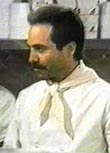|
|
 
|
|
Author
|
Topic: AKIRA KUROSAWA: A Life In Pictures
|
Gerard S. Cohen
Jedi Master Film Handler

Posts: 975
From: Forest Hills, NY, USA
Registered: Sep 2001
|
 posted 03-18-2002 10:11 AM
posted 03-18-2002 10:11 AM




PBS is broadcasting a new hour-long documentary on the 85 year life
and career of Japan's greatest filmmaker, and one of world cinema's
most creative and productive geniuses. It will air on CH 13 in the
NJ/NJ/CT region on Thursday, March 21st at 9:00 PM. This link to a Press Release gives much information on Kurosawa and the making of the Great Performances program , with downloadable images, a filmography, credits and program notes:
http://www.thirteen.org/pressroom/great_performances/kurosawa/press_release.html The program, in addition to film excerpts from films such as Rashomon, Seven Samurai, Yojimbo and Ran, will feature interviews and comments from Machiko Kyo, Toshiro Mifune, and many other actors, directors, critics and scholars. This is a great opportunity to relive some of the greatest films
and to learn about many Kurosawa works that we never had the opportunity to experience before. It should be a natural for recording! I hope we might also receive reactions from some Japanese Film-techers to this program and its subjects. .................................................................. "I HAVE WAITED FOR THIS!" --Kabuki audience shout.
| IP: Logged
|
|
|
|
|
|
|
|
Paul Mayer
Oh get out of it Melvin, before it pulls you under!

Posts: 3836
From: Albuquerque, NM
Registered: Feb 2000
|
 posted 03-20-2002 01:07 AM
posted 03-20-2002 01:07 AM





Funny how Kurosawa-sensei is highly regarded amongst film buffs outside of Japan, but largely dismissed in his own country. My own grandfather echoed that Japanese sentiment; he thought Kurosawa's films weren't Japanese enough, since they were often based on non-Japanese literary sources. Silly sods. Forgive them, for they know not what they do.  Personally, I'm glad I don't have a problem with Shakespearean or other western stories told in a Japanese setting! Just for fun, imagine The Twelfth Night done Kurosawa style, with Mifune doing his take on Sir Toby Belch... Personally, I'm glad I don't have a problem with Shakespearean or other western stories told in a Japanese setting! Just for fun, imagine The Twelfth Night done Kurosawa style, with Mifune doing his take on Sir Toby Belch...  BTW Kurosawa once published a list of what he considered to be the 100 best films of all time. Perhaps fittingly, only a couple are Japanese, one of them being the animated My Neighbor Totoro (1988) by Hayao Miyazaki. Kurosawa loved the Catbus character in that film and lamented that talents like Miyazaki were going into animation instead of live-action. Today, Miyazaki is considered by many critics to be, not the Disney of Japan, but the Kurosawa of animation! So who says Kurosawa's films weren't Japanese enough? (Jii-san gomen nasai!) Rashomon, Ikiru, The Hidden Fortress, Ran, Dreams... His films will always be amongst my personal live-action favorites, Japanese or otherwise. Long live Kurosawa! Paul
Unemployed  mercenary film/video projectionist/engineer mercenary film/video projectionist/engineer
Roll 'em! Speed! Marker! Action! Cut! Print that! Next setup!
Repeat until dead.
0
| IP: Logged
|
|
Gerard S. Cohen
Jedi Master Film Handler

Posts: 975
From: Forest Hills, NY, USA
Registered: Sep 2001
|
 posted 03-20-2002 08:14 AM
posted 03-20-2002 08:14 AM




I'd like to read Kurosawa's list of the 100 best films. I'll search for it. As for his using Western sources, Rashomon is based on two Japanese short stories, one of the rape, and the other of the temple setting where the conflict between faith and cynicism is played out at the end, over the fate of the abandoned newborn baby.That resolution shocked me as much as the report that in one of the Nazi extermination camp, a group of Jews held an all-night trial,
charging God with abandoning his people. After the sentence--GUILTY
--the judge announced "It is time to say the morning 'Shma'" [Hear,
O Israel, The Lord Our God, the Lord is One!] So after having the audience struggle emotionally through four versions of a terrible crime, trying to find the truth, the priest and the peasant, grabbing
for the baby in fine Zen fashion, again flip the audience's belief
with faith in the possibility of human goodness. For his time, Kurosawa was an innovator in film technique. I loved the way he would pan in very long focus, Mifune running through a crowded battle scene, in closeup, blurring the other combatants, yet staying with the hero. Or when he would dolly in swiftly while zooming out simultaneously, an unsettling experience for the viewer.
I was reading Japanese history when his samurai films were first
shown in the U.S., and the wars of the Shoguns seemed to come alive from his films. I thought of him as quintesentially Japanese, and am surprised to learn of his critics in Japan. It reminds me of comments I heard of the films of Satyajit Ray in India: "Ray's films
are not Indian, they are realism, and we in India have too much reality. We want our films to be fantasy. His films are not popular in India." At the time I was using Patha Panchali in my film classes, and was floored by that attitude.
| IP: Logged
|
|
|
|
|
|
Paul Mayer
Oh get out of it Melvin, before it pulls you under!

Posts: 3836
From: Albuquerque, NM
Registered: Feb 2000
|
 posted 01-10-2015 12:34 PM
posted 01-10-2015 12:34 PM





Just recently, Akira Kurosawa's (1910 - 1998) daughter Kazuko published this list, which spans from the silents through 1997.
Akira Kurosawa’s 100 Favorite Movies
1. Broken Blossoms or The Yellow Man and the Girl (Griffith, 1919) USA
2. Das Cabinet des Dr. Caligari [The Cabinet of Dr. Caligari] (Wiene, 1920) Germany
3. Dr. Mabuse, der Spieler – Ein Bild der Zeit [Dr. Mabuse, the Gambler] (Lang, 1922) Germany
4. The Gold Rush (Chaplin, 1925) USA
5. La Chute de la Maison Usher [The Fall of the House of Usher] (Jean Epstein, 1928) France
6. Un Chien Andalou [An Andalusian Dog] (Bunuel, 1928) France
7. Morocco (von Sternberg, 1930) USA
8. Der Kongress Tanzt (Charell, 1931) Germany
9. Die 3groschenoper [The Threepenny Opera] (Pabst, 1931) Germany
10. Leise Flehen Meine Lieder [Lover Divine] (Forst, 1933) Austria/Germany
11. The Thin Man (Dyke, 1934) USA
12. Tonari no Yae-chan [My Little Neighbour, Yae] (Shimazu, 1934) Japan
13. Tange Sazen yowa: Hyakuman ryo no tsubo [Sazen Tange and the Pot Worth a Million Ryo] (Yamanaka, 1935) Japan
14. Akanishi Kakita [Capricious Young Men] (Itami, 1936) Japan
15. La Grande Illusion [The Grand Illusion] (Renoir, 1937) France
16. Stella Dallas (Vidor, 1937) USA
17. Tsuzurikata Kyoshitsu [Lessons in Essay] (Yamamoto, 1938) Japan
18. Tsuchi [Earth] (Uchida, 1939) Japan
19. Ninotchka (Lubitsch, 1939) USA
20. Ivan Groznyy I, Ivan Groznyy II: Boyarsky Zagovor [Ivan the Terrible Parts I and II] (Eisenstein, 1944-46) Soviet Union
21. My Darling Clementine (Ford, 1946) USA
22. It’s a Wonderful Life (Capra, 1946) USA
23. The Big Sleep (Hawks, 1946) USA
24. Ladri di Biciclette [The Bicycle Thief] [Bicycle Thieves] (De Sica, 1948) Italy
25. Aoi sanmyaku [The Green Mountains] (Imai, 1949) Japan
26. The Third Man (Reed, 1949) UK
27. Banshun [Late Spring] (Ozu, 1949) Japan
28. Orpheus (Cocteau, 1949) France
29. Karumen kokyo ni kaeru [Carmen Comes Home] (Kinoshita, 1951) Japan
30. A Streetcar Named Desire (Kazan, 1951) USA
31. Thérèse Raquin [The Adultress] (Carne 1953) France
32. Saikaku ichidai onna [The Life of Oharu] (Mizoguchi, 1952) Japan
33. Viaggio in Italia [Journey to Italy] (Rossellini, 1953) Italy
34. Gojira [Godzilla] (Honda, 1954) Japan
35. La Strada (Fellini, 1954) Italy
36. Ukigumo [Floating Clouds] (Naruse, 1955) Japan
37. Pather Panchali [Song of the Road] (Ray, 1955) India
38. Daddy Long Legs (Negulesco, 1955) USA
39. The Proud Ones (Webb, 1956) USA
40. Bakumatsu taiyoden [Sun in the Last Days of the Shogunate] (Kawashima, 1957) Japan
41. The Young Lions (Dmytryk, 1957) USA
42. Les Cousins [The Cousins] (Chabrol, 1959) France
43. Les Quarte Cents Coups [The 400 Blows] (Truffaut, 1959) France
44. A bout de Souffle [Breathless] (Godard, 1959) France
45. Ben-Hur (Wyler, 1959) USA
46. Ototo [Her Brother] (Ichikawa, 1960) Japan
47. Une aussi longue absence [The Long Absence] (Colpi, 1960) France/Italy
48. Le Voyage en Ballon [Stowaway in the Sky] (Lamorisse, 1960) France
49. Plein Soleil [Purple Noon] (Clement, 1960) France/Italy
50. Zazie dans le métro [Zazie on the Subway](Malle, 1960) France/Italy
51. L’Annee derniere a Marienbad [Last Year in Marienbad] (Resnais, 1960) France/Italy
52. What Ever Happened to Baby Jane? (Aldrich, 1962) USA
53. Lawrence of Arabia (Lean, 1962) UK
54. Melodie en sous-sol [Any Number Can Win] (Verneuil, 1963) France/Italy
55. The Birds (Hitchcock, 1963) USA
56. Il Deserto Rosso [The Red Desert](Antonioni, 1964) Italy/France
57. Who’s Afraid of Virginia Woolf? (Nichols, 1966) USA
58. Bonnie and Clyde (Penn, 1967) USA
59. In the Heat of the Night (Jewison, 1967) USA
60. The Charge of the Light Brigade (Richardson, 1968) UK
61. Midnight Cowboy (Schlesinger, 1969) USA
62. MASH (Altman, 1970) USA
63. Johnny Got His Gun (Trumbo, 1971) USA
64. The French Connection (Friedkin, 1971) USA
65. El espíritu de la colmena [Spirit of the Beehive] (Erice, 1973) Spain
66. Solyaris [Solaris] (Tarkovsky, 1972) Soviet Union
67. The Day of the Jackal (Zinneman, 1973) UK/France
68. Gruppo di famiglia in un interno [Conversation Piece] (Visconti, 1974) Italy/France
69. The Godfather Part II (Coppola, 1974) USA
70. Sandakan hachibanshokan bohkyo [Sandakan 8] (Kumai, 1974) Japan
71. One Flew Over the Cuckoo’s Nest (Forman, 1975) USA
72. O, Thiassos [The Travelling Players] (Angelopoulos, 1975) Greece
73. Barry Lyndon (Kubrick, 1975) UK
74. Daichi no komoriuta [Lullaby of the Earth] (Masumura, 1976) Japan
75. Annie Hall (Allen, 1977) USA
76. Neokonchennaya pyesa dlya mekhanicheskogo pianino [Unfinished Piece for Mechanical Piano] (Mikhalkov, 1977) Soviet Union
77. Padre Padrone [My Father My Master] (P. & V. Taviani, 1977) Italy
78. Gloria (Cassavetes, 1980) USA
79. Harukanaru yama no yobigoe [A Distant Cry From Spring] (Yamada, 1980) Japan
80. La Traviata (Zeffirelli, 1982) Italy
81. Fanny och Alexander [Fanny and Alexander] (Bergman, 1982) Sweden/France/West Germany
82. Fitzcarraldo (Herzog, 1982) Peru/West Germany
83. The King of Comedy (Scorsese, 1983) USA
84. Merry Christmas Mr. Lawrence (Oshima, 1983) UK/Japan/New Zealand
85. The Killing Fields (Joffe 1984) UK
86. Stranger Than Paradise (Jarmusch, 1984) USA/ West Germany
87. Dongdong de Jiaqi [A Summer at Grandpa’s] (Hou, 1984) Taiwan
88. Paris, Texas (Wenders, 1984) France/ West Germany
89. Witness (Weir, 1985) USA
90. The Trip to Bountiful (Masterson, 1985) USA
91. Otac na sluzbenom putu [When Father was Away on Business] (Kusturica, 1985) Yugoslavia
92. The Dead (Huston, 1987) UK/Ireland/USA
93. Khane-ye doust kodjast? [Where is the Friend’s Home] (Kiarostami, 1987) Iran
94. Baghdad Cafe [Out of Rosenheim] (Adlon, 1987) West Germany/USA
95. The Whales of August (Anderson, 1987) USA
96. Running on Empty (Lumet, 1988) USA
97. Tonari no totoro [My Neighbour Totoro] (Miyazaki, 1988) Japan
98. A un [Buddies] (Furuhata, 1989) Japan
99. La Belle Noiseuse [The Beautiful Troublemaker] (Rivette, 1991) France/Switzerland
100. Hana-bi [Fireworks] (Kitano, 1997) Japan
| IP: Logged
|
|
|
|
|
|
All times are Central (GMT -6:00)
|
|
Powered by Infopop Corporation
UBB.classicTM
6.3.1.2
The Film-Tech Forums are designed for various members related to the cinema industry to express their opinions, viewpoints and testimonials on various products, services and events based upon speculation, personal knowledge and factual information through use, therefore all views represented here allow no liability upon the publishers of this web site and the owners of said views assume no liability for any ill will resulting from these postings. The posts made here are for educational as well as entertainment purposes and as such anyone viewing this portion of the website must accept these views as statements of the author of that opinion
and agrees to release the authors from any and all liability.
|

 Home
Home
 Products
Products
 Store
Store
 Forum
Forum
 Warehouse
Warehouse
 Contact Us
Contact Us




 Printer-friendly view of this topic
Printer-friendly view of this topic










 Personally, I'm glad I don't have a problem with Shakespearean or other western stories told in a Japanese setting! Just for fun, imagine The Twelfth Night done Kurosawa style, with Mifune doing his take on Sir Toby Belch...
Personally, I'm glad I don't have a problem with Shakespearean or other western stories told in a Japanese setting! Just for fun, imagine The Twelfth Night done Kurosawa style, with Mifune doing his take on Sir Toby Belch... 
 mercenary film/video projectionist/engineer
mercenary film/video projectionist/engineer




